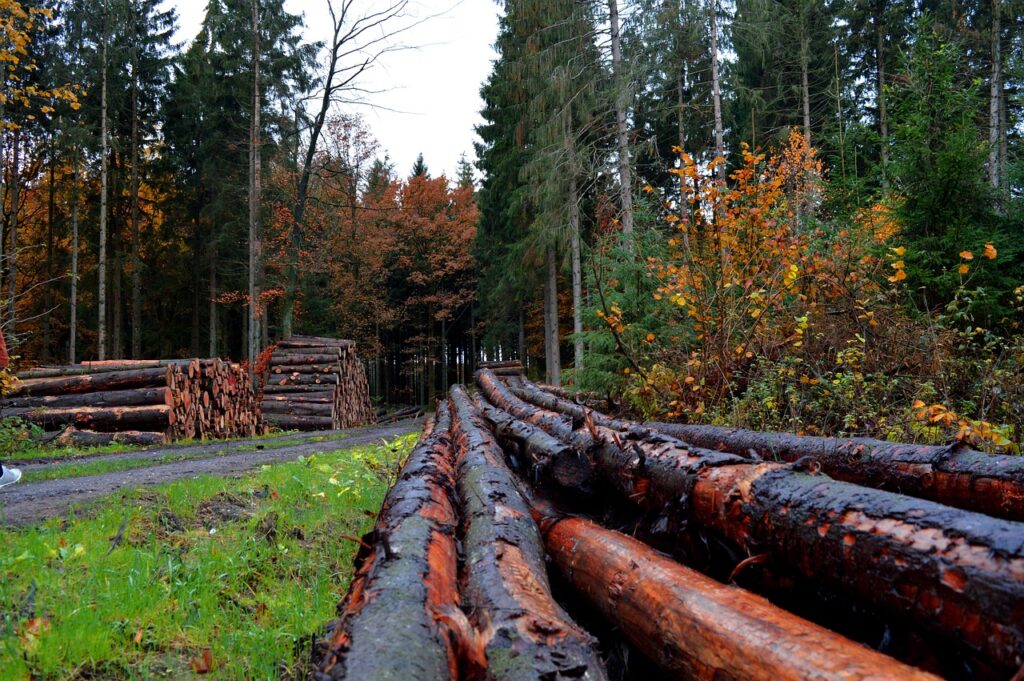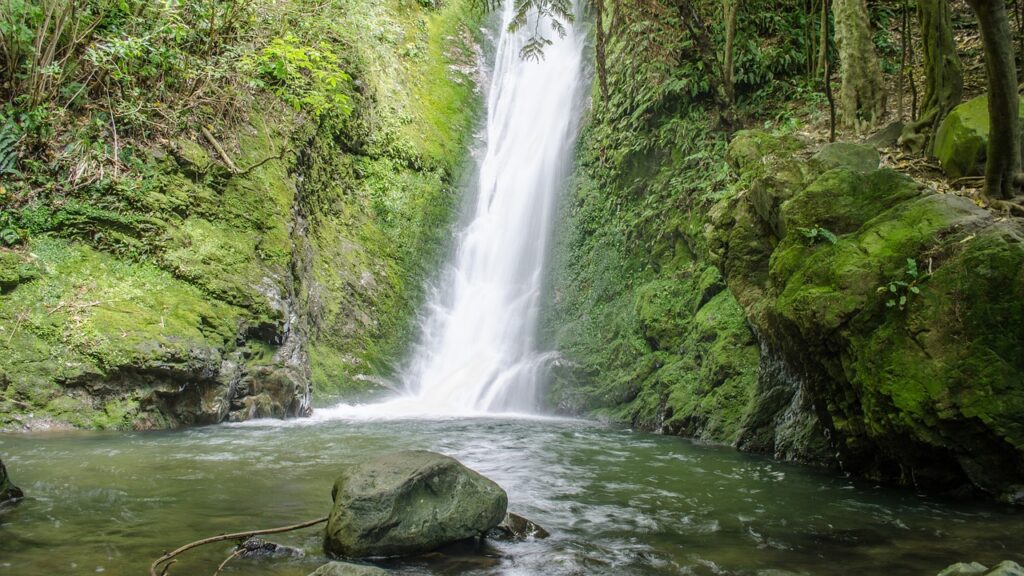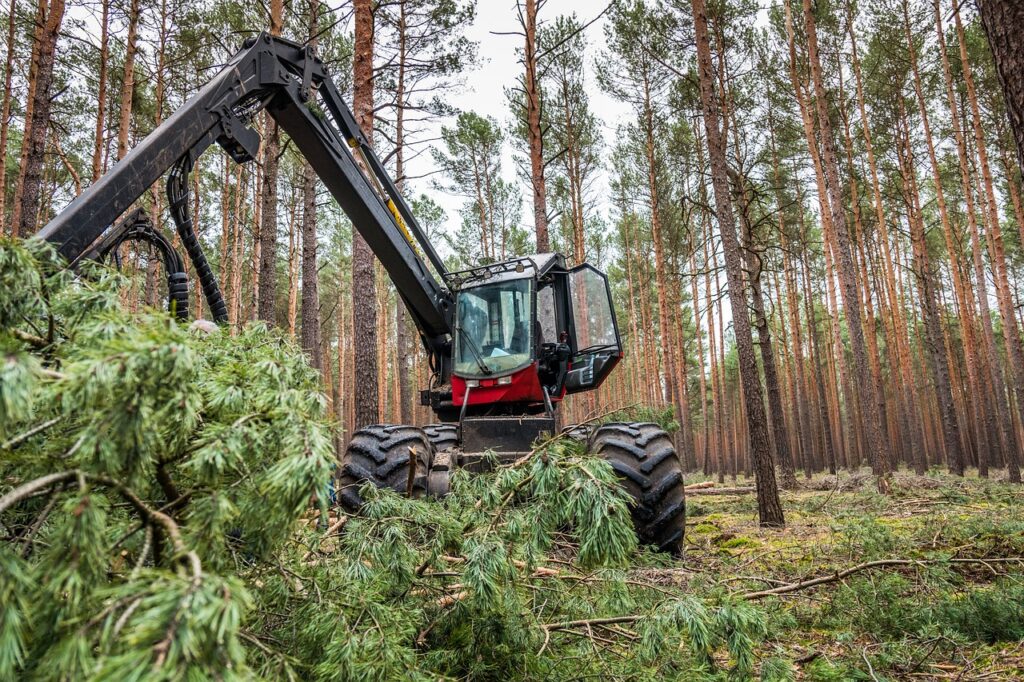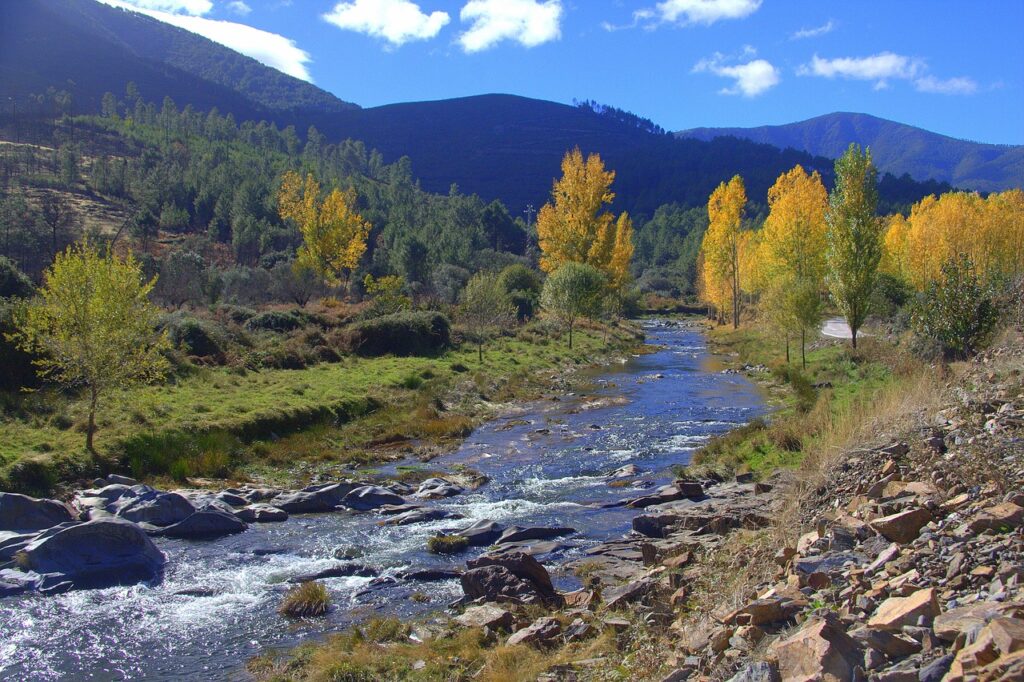
Forestry degrees serve as a crucial lever in the sustainable management and conservation of our forest resources. They equip individuals with the expertise required to balance ecological preservation with societal needs.
In this comprehensive guide, we explore the diverse landscape of forestry degrees, shedding light on the programs offered by esteemed institutions, the concentrations available, and the myriad of forestry career paths that await those passionate about preserving our planet’s vital forests. Whether you aspire to be a forester guiding sustainable harvesting practices, a wildlife biologist immersed in the study of forest fauna, or an urban forester shaping green spaces in bustling cities, this guide serves as your compass through the educational avenues and professional prospects in the captivating realm of forestry.
Forestry Degrees

Forestry Programs from Unity Environmental University
Bachelor’s in Agroforestry

Forestry Programs from Oregon State University
BA in Forestry – Concentrations in Forest Restoration and Fire; Forest Management; Forest Operations

Forestry Programs from UMass – Amherst
Arboriculture and Urban Forestry Certificate (Online)
Schools Offering Forestry Degree Programs
- Oregon State University – College of Forestry
Oregon State University is known for its comprehensive forestry programs, offering degrees that cover sustainable forestry practices, conservation, and natural resource management.
Website: https://www.forestry.oregonstate.edu/
- University of Washington – School of Environmental and Forest Sciences
The School of Environmental and Forest Sciences at the University of Washington provides a strong emphasis on research and education in forest ecology, conservation, and restoration.
Website: https://sefs.uw.edu/
- University of California, Berkeley – College of Natural Resources
UC Berkeley’s College of Natural Resources offers forestry programs that integrate ecological and social perspectives, preparing students for roles in environmental policy, management, and research.
Website: https://nature.berkeley.edu/
- Michigan State University – Department of Forestry
Michigan State’s Department of Forestry is committed to advancing sustainable forestry and natural resource management through research, outreach, and education.
Website: https://www.canr.msu.edu/for/
- University of British Columbia – Faculty of Forestry
The Faculty of Forestry at UBC is renowned for its global perspective on forestry, with programs focusing on sustainable forest management, conservation, and wood science.
Website: https://forestry.ubc.ca/
- Clemson University – College of Agriculture, Forestry and Life Sciences
Clemson’s College of Agriculture, Forestry and Life Sciences offers forestry programs that integrate hands-on experiences with a strong foundation in ecological principles and management.
Website: https://www.clemson.edu/cafls/index.html
- University of Wisconsin-Madison – Department of Forest and Wildlife Ecology
UW-Madison’s Department of Forest and Wildlife Ecology emphasizes research-driven education, providing students with a deep understanding of forest ecosystems and wildlife conservation.
Website: https://forestandwildlifeecology.wisc.edu/
- Colorado State University – Warner College of Natural Resources
The Warner College of Natural Resources at CSU offers forestry programs with a focus on sustainable practices, preparing students for careers in forest management and environmental stewardship.
Website: https://warnercnr.colostate.edu/
- Virginia Tech – College of Natural Resources and Environment
Virginia Tech’s College of Natural Resources and Environment offers forestry programs that integrate technology and innovation into forest management, addressing contemporary challenges in the field.
Website: https://cnre.vt.edu/
- University of Montana – College of Forestry and Conservation
The College of Forestry and Conservation at the University of Montana provides interdisciplinary forestry programs with a strong emphasis on field experiences and research in forest ecosystems.
Website: https://www.umt.edu/environment/
- North Carolina State University – College of Natural Resources
NC State’s College of Natural Resources offers forestry programs that cover a broad range of topics, including forest ecology, management, and economics, preparing students for diverse roles in the field.
Website: https://cnr.ncsu.edu/
- University of Idaho – College of Natural Resources
The College of Natural Resources at the University of Idaho offers forestry programs that combine scientific knowledge with practical skills, preparing graduates for careers in forest management and conservation.
Website: https://www.uidaho.edu/cnr

Exploring Types of Forestry Programs in College
The journey into forestry education begins with understanding the varied educational paths available. Colleges and universities offer a diverse spectrum of forestry degree programs that cater to different academic levels and career aspirations. At the core of these programs lies a commitment to cultivating knowledgeable professionals equipped to manage and sustain our vital forest resources.
Undergraduate Degrees in Forestry
Starting with associate degrees, students are introduced to the foundational aspects of forestry, encompassing both theoretical and practical learning experiences. These programs often serve as a springboard for further education or entry-level positions within the field. As students progress to bachelor’s level studies, they are presented with a more in-depth exploration of forestry science, delving into specialized subjects such as forest management, wildlife conservation, and environmental policy.
Graduate Degrees in Forestry
For those seeking advanced knowledge and leadership roles, graduate education in forestry takes center stage. Master’s degree programs encourage a deeper dive into research, policy development, and sophisticated management strategies. Doctoral studies in forestry push the boundaries of research and academia, grooming experts who will contribute to the future of forest conservation and sustainability.
It is essential to recognize the wealth of forestry specializations that these programs offer. Specializations such as urban forestry, forest biometrics, and forest economics allow students to align their academic pursuits with specific career goals. By choosing a specialization that resonates with their interests and the demands of the job market, students can tailor their education to become skilled professionals in their chosen niche.
Advantages of Pursuing an Online Forestry Degree
The pursuit of an online forestry degree presents a wealth of advantages, particularly for adult learners who require a flexible and convenient educational model. This mode of learning caters to those who may already be juggling professional responsibilities or personal commitments, allowing them to access coursework and lectures at times that suit their schedules. The virtual classroom becomes an accessible space, free from geographic and time constraints, enabling learners from diverse backgrounds to advance their education without upending their lives.
Moreover, an online forestry degree nurtures lifelong learning, ensuring that education does not cease upon graduation. The forestry field constantly evolves, with new research and sustainable practices emerging regularly. Online programs are uniquely positioned to integrate these advancements, fostering leadership development in forestry. Graduates emerge not only with a robust understanding of current industry standards but also with the skills to spearhead innovation and change.

Forestry Degree Courses and Curriculum
As the forestry industry continues to evolve, the educational landscape adapts to prepare students for the challenges and opportunities in this field. A major in forestry offers diverse pathways, each with its own set of skills tailored to different aspects of forest management and conservation. Understanding the common forestry major concentrations and their industry relevance is key for students aiming to align their education with career aspirations.
One of the primary courses in an online forestry degree program is Forest Ecology. This course delves into the intricate relationships between forest organisms and their environment, a foundational aspect for anyone working in forestry. Equally important is Forest Resource Management, where students learn to balance environmental sustainability with the economic demands of forest resources.
Forest Operations is a pragmatic course focusing on the practical aspects of forestry work, including timber harvesting and the logistics of forest products. In contrast, Ecology of Managed Forests looks at the interplay between human activity and forest ecosystems, emphasizing sustainable practices.
Given the increasing impact of climate change on forested landscapes, Fire Ecology is gaining prominence. This subject explores the role of fire in forest ecosystems and the strategies for managing fire-prone landscapes. Forest Policy is another critical area, examining the laws and regulations that govern forestry activities and how they shape the profession.
Lastly, Forest Resource Economics rounds out the curriculum by providing insights into the economic principles that drive the forestry industry. This course is essential for understanding the market forces affecting forest management decisions.
Each of these courses plays a significant role in forming a well-rounded forestry professional capable of making informed decisions that benefit our forests and meet societal needs. By carefully selecting their specializations, students can tailor their education to the niche they are most passionate about, ensuring a fulfilling career in the dynamic field of forestry.

Forest Degree Specializations
Forestry degree programs often offer various concentrations or specializations to allow students to focus on specific aspects of forestry. Here are some common forestry degree concentrations that colleges may offer:
Forest Management
Focuses on sustainable forest practices, including planning, harvesting, and regeneration.
Forest Ecology
Emphasizes the study of forest ecosystems, biodiversity, and ecological processes.
Wildlife Management
Concentrates on the conservation and management of wildlife species within forest ecosystems.
Wood Science and Technology
Explores the utilization of wood, including timber harvesting, processing, and product development.
Conservation Biology
Addresses the conservation of forested landscapes and biodiversity within those ecosystems.
Urban Forestry
Focuses on the management and planning of trees in urban environments for ecological and social benefits.
Natural Resource Management
Integrates forestry with broader natural resource considerations, including water, soil, and wildlife.
Forest Economics and Policy:
Examines the economic aspects of forestry and explores policy implications related to forest management.
Fire Ecology and Management
Addresses the role of wildfires in forest ecosystems and strategies for fire management.
Remote Sensing and GIS in Forestry
Utilizes technology for mapping, monitoring, and analyzing forest landscapes.
Forest Health and Pathology
Focuses on identifying and managing diseases, pests, and other threats to forest health.
Climate Change and Forestry
Explores the impact of climate change on forest ecosystems and strategies for adaptation and mitigation.
These concentrations allow students to tailor their education to align with their specific interests and career goals within the broader field of forestry. It’s important to check with individual colleges to see which concentrations they offer as part of their forestry degree programs.

The Value of a Forestry Degree
Embarking on a career in forestry can be both financially rewarding and personally fulfilling. Graduates with a forestry degree often find themselves well-positioned in the job market, with a diverse range of career opportunities that offer competitive earnings and high levels of job satisfaction. As the guardians of our forests, these professionals play a critical role in managing and preserving one of our most valuable natural resources, an endeavor that comes with its own intrinsic rewards.
When it comes to potential earnings, forestry graduates can expect to see a return on their educational investment. Salaries vary depending on the specific career path, level of experience, and geographical location, but overall, the forestry sector offers stable and attractive compensation packages. Moreover, many who choose this field report high levels of job satisfaction, deriving a sense of pride from their contribution to environmental conservation and sustainability.
A degree in forestry opens doors to a career path that is not only viable in terms of financial prospects but also enriching due to the positive impact on the environment. With a steadfast focus on sustainability and conservation, forestry professionals enjoy a career that aligns closely with their values and passion for the natural world.
Career Opportunities with a Forestry Degree
An online forestry degree opens the door to a wide array of professional opportunities in the environmental sector. Graduates can embark on career paths that include roles as Forest and Conservation Workers, Technicians, Conservation Scientists, and Foresters, among others. Each of these roles plays a crucial part in the stewardship of our natural resources, with responsibilities ranging from managing forest resources to enforcing environmental regulations.
The realm of forestry offers more than just a job; it provides a platform for lifelong learning and the pursuit of personal growth. Continuous education is paramount in this dynamic field, with advancements and sustainability practices constantly evolving. Professionals in forestry must adapt and enhance their knowledge and skills to stay at the forefront of the industry.
Moreover, a degree in forestry is not just about securing a position but also about advancing in one’s career. Those who invest in their education, embracing the opportunities for continuous learning and development, will find themselves well-equipped to take on leadership roles and

Top Careers in Forestry
Forester
Foresters manage and oversee forests, including planning and implementing sustainable harvesting, regeneration, and conservation practices.
Wildlife Biologist
Wildlife biologists focus on the study and management of wildlife within forest ecosystems, monitoring populations and contributing to conservation efforts.
Conservation Scientist
Conservation scientists work on preserving natural resources, including forests, and develop strategies for sustainable land use and ecosystem protection.
Forest Ecologist
Forest ecologists study the relationships between organisms and their environment within forest ecosystems, conducting research to inform conservation and management practices.
Timber Buyer/Procurement Forester
Professionals in this role purchase timber from landowners, manage contracts, and ensure sustainable harvesting practices.
Urban Forester
Urban foresters focus on managing and planning trees in urban areas, addressing issues such as tree health, green spaces, and community engagement.
Arborist
Arborists specialize in the care and maintenance of individual trees, often working in urban settings to assess and manage tree health.
Forest Products Industry Manager
Individuals in this role oversee operations in the forest products industry, including timber processing, manufacturing, and distribution.
Fire Management Specialist
Fire management specialists develop and implement strategies for preventing and managing wildfires in forested areas.
Environmental Consultant
Environmental consultants provide expertise on environmental issues, including forestry, to organizations and government agencies.
Research Scientist
Research scientists in forestry conduct studies to advance knowledge in the field, contributing to sustainable forest management practices.
Climate Change Analyst in Forestry
Professionals in this role assess the impact of climate change on forests and develop strategies for adaptation and mitigation.
Forest Policy Analyst
Forest policy analysts work on developing and analyzing policies related to forest management, conservation, and land use.
Forest Educator
Forest educators may work in schools, nature centers, or outreach programs to educate the public about forests and environmental stewardship.
These are just a few examples, and the field of forestry offers diverse career paths that cater to various interests and specialties within the broader realm of natural resource management.
Forge Your Path Forward With a Degree in Forestry
As we conclude this guide to forestry degrees, we invite you to envision a future where your passion for forests transforms into a meaningful career. The diverse range of programs and concentrations showcased here underscores the multidimensional nature of forestry education, catering to a spectrum of interests from sustainable management to wildlife conservation and beyond. Armed with a forestry degree, you become an advocate for our planet’s green lungs, contributing to the delicate balance between human needs and ecological preservation.
The journey doesn’t end with graduation; it evolves into a lifelong commitment to nurturing and safeguarding our forests. Whether you find yourself in the heart of a dense woodland or at the forefront of urban green initiatives, your forestry education is a compass guiding you toward a profession where every decision leaves an imprint on the world around you. Embrace the opportunities, delve into the complexities, and let your forestry degree be the key to unlocking a career that sustains both nature and your professional aspirations. The forest beckons and your journey has only just begun.
